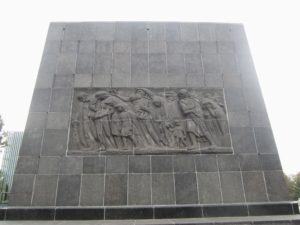The Museum of the History of Polish Jews officially opened on October 28, 2014 to much fanfare. Over 700 Polish Jews, and their descendants from around the world, gathered in Warsaw to celebrate the landmark museum’s opening. These visitors were welcomed to a private preview prior to opening.
The museum first opened its doors to the public in April 2013 as a ‘soft’ opening. The museum was not yet complete, despite construction that began in 2007. When we visited Warsaw in October 2013 the museum was open. We viewed the museum in passing but did not have time to visit. We did stop at the Monument to Ghetto Heroes, which stands nearby, in direct alignment with the main entrance.

 The physical location of the museum contains much symbolism. The 43,000 square foot building sits in the heart of what used to be the Jewish Ghetto. For over a thousand years Poles and Jews co-existed peacefully. Since the founding of the Kingdom of Poland in 1025, Poland remained the most tolerant country in Europe, and Jews brought a level of prosperity to the country. As a direct result it also became a haven and center of Jewish culture. By the middle of the 15th century seventy-five percent of the world’s Jews lived in Poland. By the end of World War II ninety percent of Poland’s Jews were murdered by Hitler and Stalin.
The physical location of the museum contains much symbolism. The 43,000 square foot building sits in the heart of what used to be the Jewish Ghetto. For over a thousand years Poles and Jews co-existed peacefully. Since the founding of the Kingdom of Poland in 1025, Poland remained the most tolerant country in Europe, and Jews brought a level of prosperity to the country. As a direct result it also became a haven and center of Jewish culture. By the middle of the 15th century seventy-five percent of the world’s Jews lived in Poland. By the end of World War II ninety percent of Poland’s Jews were murdered by Hitler and Stalin.
The peaceful tolerance waned in the 16th century with the Protestant Reformation and other religious movements. When Poland was partitioned in the late 1790’s by the Russian, Austrian and Prussian (modern day Germany) empires, anti-Semitism grew in intensity, especially in the portions of Poland owned by the Prussians and the Russians. Warsaw came under Russian rule. Krakow to the south came under Austrian rule and Jews there had an easier time.
The museum is referred to as POLIN, for the earlier name given to the country: PO-lin.
On a current events note, the eighty-one year old director Roman Polanski was spotted and photographed at the opening. He was ten years old when he survived the Krakow Ghetto. He spent the remainder of the war with kind Gentiles who saved his life. He brought that experience to his 2002 movie The Pianist. His mother died in Auschwitz.
He remains a wanted man in the United States for a 1977 conviction for having sex with a 13 year old. He fled the country in 1978. His victim, now age 51, has reportedly forgiven him and gotten on with her life. The delicate balance in extraditing Polanski to the United States rests on several things. Poland passed a law in 2010 that places a statute of limitations on charges, meaning they are too old for extradition. However that statute does not apply to US citizens. Poland and the United States are allies. Does Poland refuse to allow Polanski, a respected man in Poland, to be extradited? The move could throw an irritation into its relations with the US, just as its eastern borders are potentially threatened by Putin in the Ukraine. Does Polanski return to his home in France, where extradition would be far less likely? He wants to stay in Poland with assurances, so that he can film a new movie in Poland. The matter has yet to play out on the world stage.
Photos taken by author.
